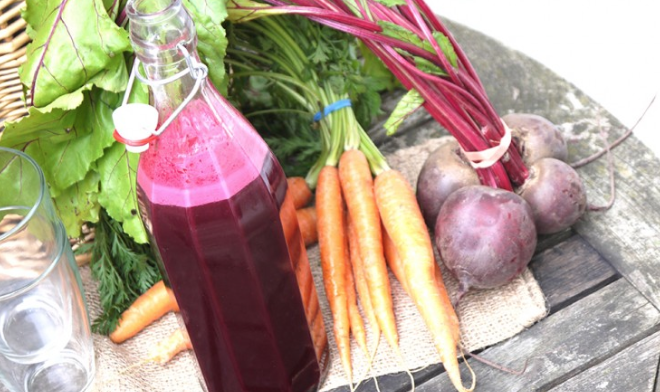
I get asked a lot of questions about which is ‘better for you’ .. blending, aka smoothies, or juicing.. and I would love to know what you think once you’ve read this blog post.. so do leave any comments below!
- What’s the Difference between Blending (Smoothies) and Juicing (Juices)?
Smoothies are drinks that include the whole of the fruit and/or veg, including the fibre, whereas juicing extracts water and most of the vitamins and minerals, leaving the fibre (pulp) behind to produce a juice.
- What is Fibre?
Fibre can be broken down into two main types, soluble and insoluble:
– Soluble fibre, found in the fleshy part of fruit and vegetables, oats, golden linseeds, beans and pulses, dissolves in the stomach to form a liquid/gel and helps to soften stools (making it easier to go to the toilet!), lower cholesterol levels and promote healthy gut bacteria.
– Insoluble fibre, found in whole-grains, nuts and seeds and the edible skins of fruit and vegetables, can’t be digested and increases stool bulk and transit time, therefore preventing constipation.
Higher fibre foods are also good for us they tend to have a lower ‘glycaemic index’ which means that they release their energy more slowly, keeping you feeling fuller for longer. There is also evidence to show that diets rich in fibre can prevent heart disease, diabetes, and certain cancers such as colorectal. The average person in the UK eats around 14g of fibre a day, however we should be eating at least 18g from optimal health. Some people may need to modify their fibre intake though, e.g. if they have a digestive disorder such as irritable bowel syndrome (IBS) .. which is when juices may be more tolerable.
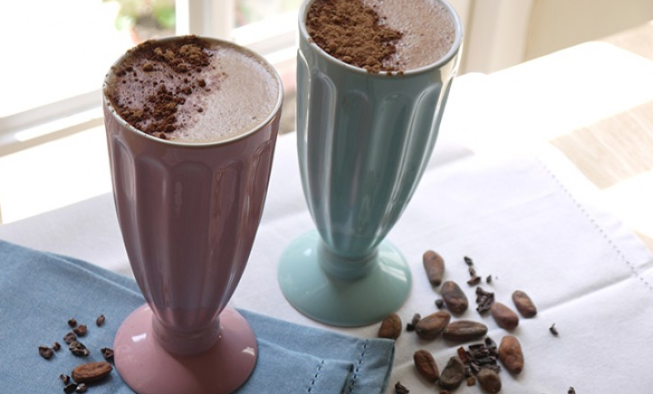
- Juicing & Juices
Juices are high in vitamins and minerals and with the fibre extracted can, for some people e.g. those with digestive disorders, be better tolerated. Juices are often less filling than smoothies so drinking a juice could easily be done in addition to meals and snacks, for a nutrient boost, and without the fibre you can pack more fruit and veg into a single serving. Juicing does however require more time and effort to prepare, with more cleaning up afterwards (not forgetting the disposal of the fibre aka ‘pulp’!). Home-made juices can be made with either vegetables or fruit or a mixture of the two. If you want to know more about the ‘juice diets’ that are promoted for weight loss then check out [this blog post] from my friend and registered dietitian Helen!
To juice at home you will need a juicer .. checkout [this webpage] for recipe ideas!
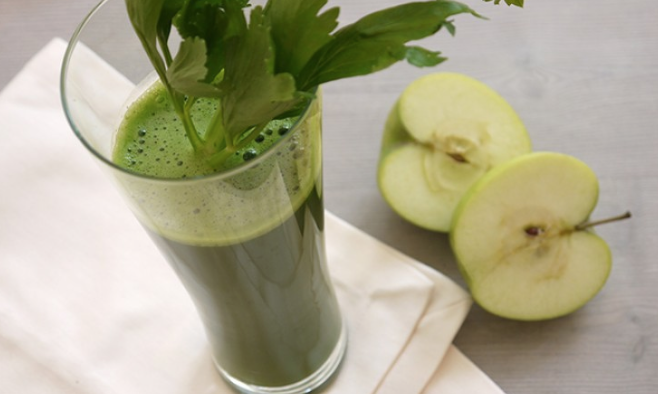
- Blending & Smoothies
Smoothies tend to be more filling, and are generally faster and easier to prepare. Smoothies, especially when made with milk or yoghurt can make an ideal breakfast or snack and will provide vitamins, minerals and fibre as well as protein and calcium. With the fibre still intact, the volume will increase, meaning smoothies are great for helping you to feel fuller for longer. Smoothies are usually made with fruit as a base, with vegetables such as spinach added to boost the nutrient content, but not to impact on the taste.
To make smoothies at home you will need a blender – read my blender review for more information and checkout [my smoothie recipes] for inspiration!
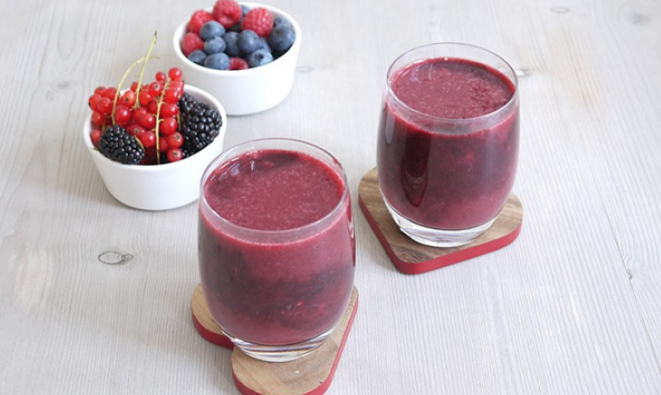
- Home Made vs. Shop Bought?
Nothing beats home made, however shop bought smoothies and juices can be convenient when out and about. Make sure though to read the label before you buy.. go for 100% fruit/vegetable drinks in single size servings – it can be easy to consume vast amounts of ‘liquid calories’ if you buy smoothies/juices in large containers: if you ate the fruit whole, instead of blended/juiced then you would feel fuller in fewer calories due to the action of chewing which sends signals to our brain telling us that we are eating!
Personally I’m a fan of single serve fruit smoothies as well as the juices that combine both fruit and vegetables e.g. orange and carrot juice. Stay clear from anything labelled ‘juice drink’, or at least check the ingredients list first – if you are paying for mainly water/sugar think twice before you buy!
- Are Juice Cleanses or Liquid Detox Diets worth the Hype?
Two words.. ‘money making’ or ‘not needed’. As humans we DO NOT need to ‘detoxify’ our bodies.. that’s the job of our liver and kidneys. Yes cutting down on alcohol, stopping smoking, reducing intake of processed junk in replace of fresh and wholesome foods is beneficial, but flushing out your system with juices/cleansing drinks is not necessary and can in some cases be harmful; inducing diarrhoea, abdominal discomfort and dehydration, which could lead to electrolyte imbalances and nutrient depletion; cleansing diets are often low in protein, which is needed to support muscle gain/maintenance.
Cleanses are NOT needed for weight loss – if anything they may induce a temporary reduction in weight due to less fibre, water and glycogen (stored energy) being present in the body but a drop in body weight does NOT mean a drop in body fat! There are no convincing clinical trials to promote the notion of juice cleanses or detoxes. A healthy balanced diet sufficient in fibre and fluid is enough to maintain a healthy body and digestive system.
Playing devil’s advocate though.. a juice cleanse lasting only a few days may not be harmful and could offer a psychological ‘break’ from food.. which some people find useful. I for one though love my food too much for that ;).
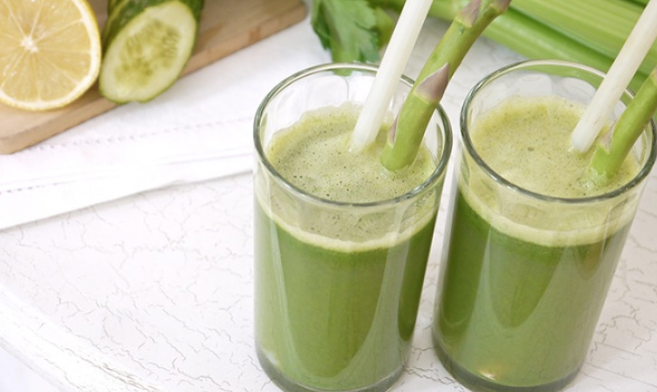
- The Verdict?
From a personal point of view, although I’m a massive fan of the idea of juicing, I prefer blending my fruits and vegetables at home because:
- Smoothies contain the whole fruit/veg and so are higher in fibre, they release their energy slowly and are more filling.
- You can add milk, yoghurt or whey protein to boost the calcium/protein content.
- They taste sweet, even when you add green veg (check out my green monster smoothie!).
- They are quick to make and all you need is a blender.
- There is much less cleaning up to do in comparison to juicing and there is less waste too!
If I’m out and don’t have the luxury of a home-made smoothie, I may pick up a 100% fruit/milk smoothie in a single size serving as a filling snack or a 100% fruit and/or vegetable drink as a hydrating and nutritious drink. Smoothies and juices can be a great addition to your day but are NOT needed to ‘cleanse’ or ‘detoxify’ your body and if drunk to excess, at the expense of a varied and balanced diet could lead to nutrient deficiencies/unwanted side-effects.
Are you a juicer or a blender?! I would love to know… I really must get the juicer that I was given out and start experimenting.. you never know I may just be converted!
*This blog post has been written in collaboration with Tribest. This blog post contains affiliate links. I do not recommend products mentioned more than others. Please read my disclaimer page for more information.
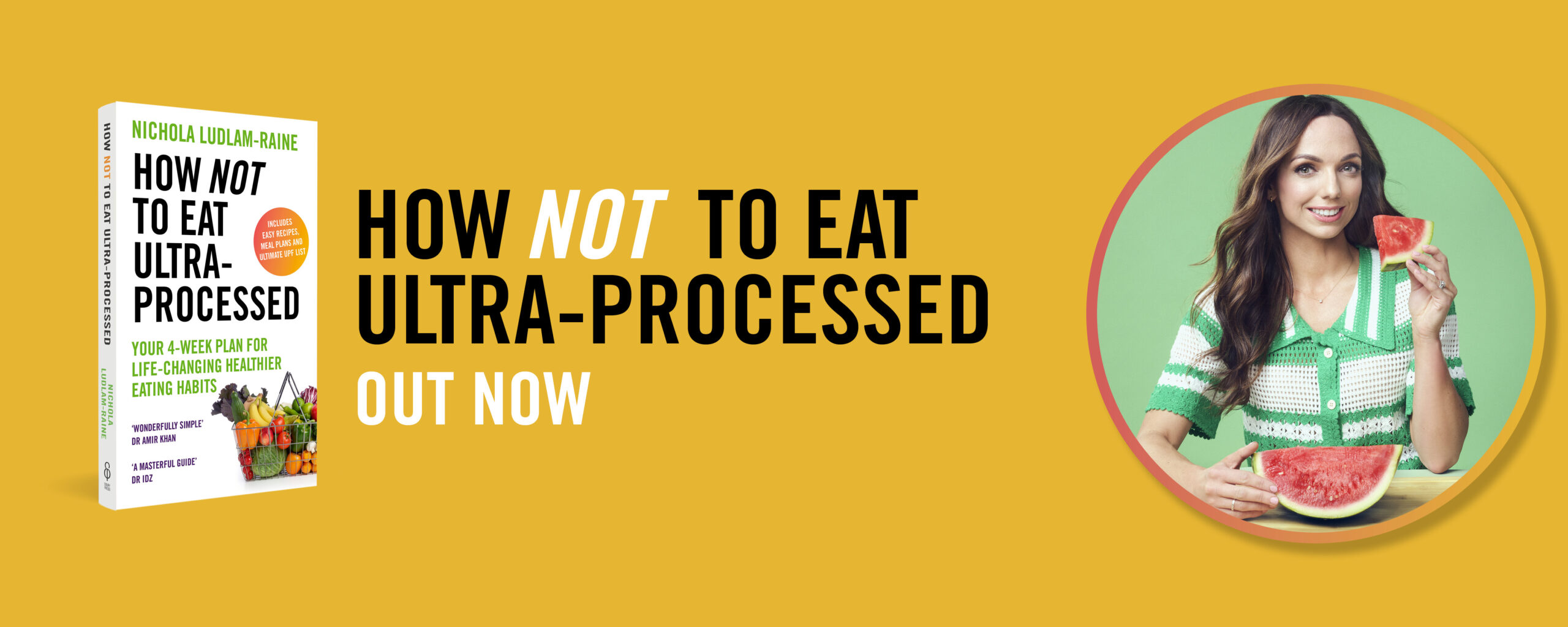
I love juices and smootheis – depends what mood I’m in. Really need a better blender though, mine is great for fruit but greens are left rather too ‘bitty’ – espcically kale. But wow, decent blenders are expensive! Think I would go with smoothies more often if I do get a good blender as they are so much easier than juicing – and there’s only so many things you can make with the leftover juice fibre.
I couldn’t agree with you more Heather! I have a waring pro blender personally and although it was expensive at the time I know it will last me a life time – I use it nearly every day! I will be reviewing the Tribest Personal Blender soon which is better for smoothies on the go – look out for it on my YouTube Channel! xx
I did a 3-4 day juice thing last year which was tough as I also love food. It was just before my holiday and the break from food was a relief as I often feel bloated. it made me realise that I eat too much inbetween meals and not always good stuff. I’m not keen to do this regularly and am thinking of just doing the odd juice, maybe twice weekly. I prefer the vegetable ones too as I worry about all the fruit sugars.
I tend to make more smoothies in the summer, for breakfast on the run, however now that I’ve discovered overnight oats my smoothie making has reduced 🙂
Thanks for your comment Stephanie!
I like both but smoothies are my no1 choice. What I need in my life is a Vitamix ha!
Hehe ditto!! They make great nut butters I’ve seen!!
I have just started to juice on a regular basis after years of blending. I have IBS and find that a juice in the morning is a much better way for me to get my nutrients without worrying about the fibre first thing. I’ve really noticed a positive change in my skin and nails and also my general health. I’d normally maybe blend later in the day if I was going to, when it seems like less of a challenge for my gut! It is a faff juicing though, I wish I could find a use for the pulp! Thanks for the post, its interesting stuff comparing the two. x
What a great comment! Thanks Laura! That’s so interesting to know xx
This has been super helpful as I’ve debated doing a juice cleanse several times but never known if it was effective or safe to do. I’ve also never thought of a smoothie as being a way to increase my intake of good nutrients and fibre. It’s helped me to understand more behind the advantages of a smoothie, so think I’ll be encorporating a smoothie for my breakfast once or twice a week at work instead of overnight oats just to mix things up a bit x
I’m so glad to have helped – thank you so much for your comment! x
This is a great post Nic, I’ve been doing my own research into this topic as I have recently started juicing over blending, and find it stirs up a lot of different opinions.
Everyone is individual, I do it to ensure a get nutrients from a variety of fruit & veg, as I don’t always eat enough to be honest! I do love the odd green smoothie though!
Thanks for the great post – very informative!
If I had the time/energy I would do juicing 🙂 hehehe! Thanks for your lovely comment!
I love a Homemade Blended smoothy every morning. Melon/strawberries/spinach/orange juice/Alpro milk can even add a banana or a spoon of total yoghurt. Couple of ice cubes and fire that baby up. Doesn’t matter how much spinach you put in you can’t taste it.
Blenders don’t have to be expensive can pick them up in supermarkets for cheap enough.
Smoothies are really filling/tasty and really heathy so a winner all round.
Totally agree with you Chris! I add spinach to all my protein smoothies 🙂 x
blending is better than juicing i think! As you mentioned the main reason is that they are very bulky and thus very filling. I have done the 10 day juice cleanse for experimenting and i droped a lot f weight ( i know it is not fats lol 🙁 ) and the great result i saw was in my skin!! Really cleared my skin and gave a brighter complextion. I tend to have a smoothie per day as a snack between lunch and dinner and it still helps give skin an amazing glow x
Ooh maybe you should carry on lots of fruit and vegetables to your diet!! Sounds like it worked for you 🙂 xx